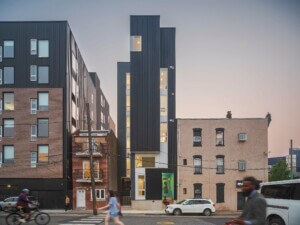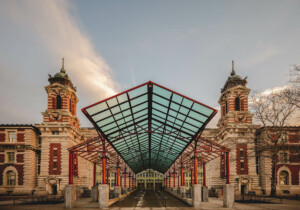The University of Pennsylvania Weitzman School of Design announced this week that lauded architectural and urban historian Amber Wiley will join the school’s faculty next year as Presidential Associate Professor and as the inaugural Matt and Erika Nord Director of the school’s Center for the Preservation of Civil Rights Sites (CPCRS). In her professorship role, she will largely teach in Weitzman’s Graduate Program in Historic Preservation.
Wiley’s teaching appointment begins next January, and she will then assume the directorship role in July 2023, taking the reins from CPCRS founding faculty director Randall Mason, a professor in the Graduate Program in Historic Preservation and former faculty director of PennPraxis. Mason will continue to contribute to CPCRS projects, according to a formal announcement released by the school.
“This is as close to a dream job as one can get, and I am looking forward to building on the work that Randy Mason has done and moving the vision forward,” said Wiley, who currently serves as assistant professor of art history at Rutgers University. “As we re-examine the multitude of ways people have fought against oppression in this country, and understand how these stories and battles are embedded within the built environment, CPCRS can be instrumental.”
Established in 2019, CPCRS works in partnership with a range of organizations and institutions in Philadelphia and beyond to “raise visibility and build capacity where historic preservation and civil rights histories intersect,” the school explained. “CPCRS maintains a program of research, teaching, and fieldwork to re-orient the preservation field toward narratives, ideas, and practices embodying the preservation of civil rights heritage and access to heritage as a civil right.” Outside of Philadelphia, CPCRS’s key partner organizations include the National Park Service and Tuskegee University in Alabama.
Wiley earned a BA in Architecture from Yale University, Master of Architectural History and Certificate in Historic Preservation from the University of Virginia School of Architecture, and PhD in American Studies from George Washington University. Her work, which spans scholarship and activism, has been recognized and supported by a range of institutions including the Association of Collegiate Schools of Architecture, Vernacular Architecture Forum, Dumbarton Oaks, the Mellon Foundation, and the Society of Architectural Historians, among others. Per the school, her scholarship “examines how preservation and public history contribute to the creation and maintenance of the identity and sense of place of a city. Her work focuses on the ways local and national bodies have claimed the dominating narrative and collective memory of cities.”
Completed interpretation, research, and visioning projects include those undertaken for Monument Lab, Association for the Study of African American Life and History, the DC History Center, the National Trust for Historic Preservation, and the National Building Museum. Wiley was also co-principal investigator of the Carter G. Woodson Home National Historic Site National Historic Landmark Nomination Update and is a founding member of the DC Legacy Project: Barry Farm-Hillsdale steering committee.
Last year, Wiley sat down with AN’s Samuel Medina to discuss the largely undocumented histories of 1960s-era Brutalist public high schools in Washington, D.C., specifically those designed by Black-owned architecture firms. These schools, including Shaw Junior High School and Dunbar High School, are the focus of Wiley’s forthcoming book from the University of Pittsburgh Press, Model Schools in the Model City: Race, Planning, and Education in the Nation’s Capital. Another ongoing research effort is The Revolution Continues: The Legacy of Black Heritage Movement, which examines the influence of the Afro-American Bicentennial Corporation on the historic preservation movement in the 1970s.
At Rutgers, Wiley’s current project is Collective Yearning: Black Women Artists from the Zimmerli Art Museum, a multimedia exhibition that she curated alongside her students. The show is currently on view through December 14 at two locations: the Mary H. Dana Women Artist Series Galleries (Douglass Library) and the Zimmerli Art Museum in New Brunswick, New Jersey. This exhibition marks the first time that the university has conducted a “comprehensive and methodical review” of its art holdings produced by Black women artists.
AN looks forward to following Wiley’s next chapter at the Weitzman School of Design and CPCRS.











